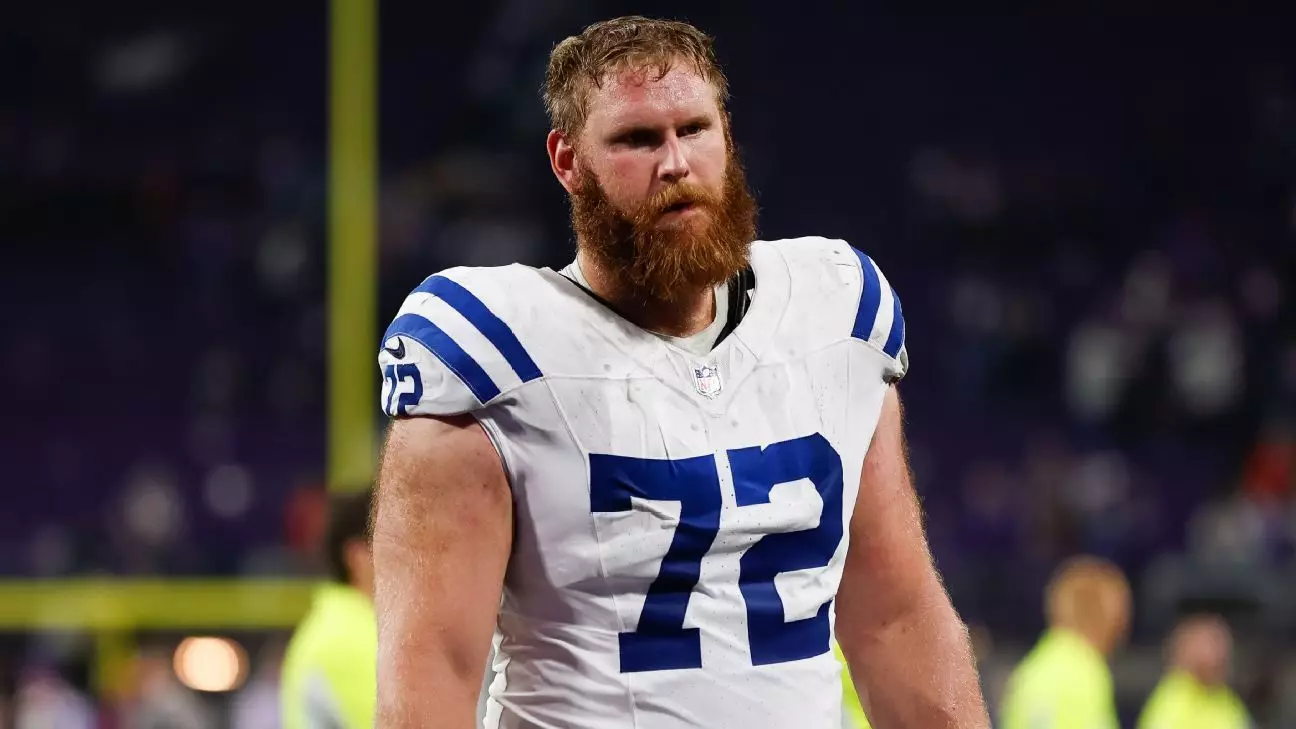The past few years have illuminated the hidden struggles that many athletes face, and Braden Smith, the offensive tackle for the Indianapolis Colts, exemplifies this painful reality. Last season, Smith missed the final five games due to personal issues, which turned out to be rooted in a serious mental health crisis. In a frank interview with the Indianapolis Star, he shed light on his battle with obsessive-compulsive disorder (OCD) and the depths of despair he faced, openly admitting that suicide was a thought that crossed his mind. His experiences serve as a powerful reminder that even those at the pinnacle of physical prowess can be grappling with unseen torments.
Smith’s candidness about his mental health journey breaks down the stigma often associated with such struggles. The phrase “I was physically present, but I was nowhere to be found” resonates deeply, encapsulating how mental health issues can render individuals present in body but absent in spirit. The dichotomy of being an athlete and feeling disconnected from the fundamental joys of life—his family, his career, his sense of self—paints a poignant picture of his ordeal.
Understanding Religious Scrupulosity
One of the more alarming aspects of Smith’s condition is his diagnosis of religious scrupulosity. This specific form of OCD inflicts its victims with constant anxiety regarding the moral implications of their thoughts and actions, often leading to obsessive behaviors such as frequent prayer or incessant attempts at atonement. Smith’s statement, “There was only one person that was ever perfect, and that was Jesus,” underscores the tremendous psychological burden he felt while trying to emulate an unattainable standard. It highlights how deeply ingrained religious beliefs can, paradoxically, become sources of torment when mixed with obsessive thinking.
Understanding the complexities of religious scrupulosity is essential for society to grasp that, while some may view faith as a pillar of strength, for others, it can morph into debilitating anxiety. This perspective invites a broader dialogue about faith, mental health, and the necessity for compassionate support systems.
The Road to Recovery
Smith’s road to recovery wasn’t linear. After realizing the extent of his mental struggles, he sought help from a psychologist and eventually spent time in a mental health facility. However, the common misstep many face in therapy is the presumption that traditional methods will suffice for all. Sometimes, a more unorthodox approach is necessary. For Smith, this meant seeking treatment with ibogaine, a psychedelic substance currently illegal in the U.S. but recognized in some studies for its therapeutic potential.
Traveling to Mexico for this treatment may seem extreme, yet it is a testimony to Smith’s desperation and desire to reclaim his life. There is an inherent tension in discussing such interventions: the societal disapproval of psychedelic use juxtaposed with genuine accounts of recovery pushes the conversation into complex territory. Smith’s success after these treatments calls for an open-minded evaluation of alternative mental health therapies.
A New Perspective on Life and Football
Upon returning from his journey of healing, Braden Smith articulates a newfound clarity in his life. No longer trapped in the whirlpool of compulsive thoughts and anxiety, he now approaches life—both professional and personal—with a refreshing sense of purpose. The mental space he has regained allows him to engage with his family, his sport, and his aspirations without the suffocating weight of OCD.
Colts General Manager Chris Ballard shared his confidence in Smith’s return, stating, “Braden Smith is back, and he’s in a great spot.” The acknowledgment from his team underscores a crucial point: that athletes should not be defined solely by their on-field performance, but rather be viewed holistically as individuals with multifaceted lives. Smith’s restructuring of his contract to $8 million not only signifies a financial adjustment but also illustrates his commitment to finishing what he started in Indianapolis.
The Call for Change in Mental Health Awareness
Braden Smith’s journey brings to light the urgent need for change in how mental health is perceived within professional sports. It shatters the misconceptions that athletes, because of their physical prowess and success, are immune to mental health challenges. His story underscores the importance of creating a supportive environment and fostering open discussions about mental health in the locker room and beyond. The challenges faced by athletes like Smith are not just personal crises; they highlight a broader cultural issue around mental health that demands urgent and compassionate attention. In a world where success is often defined by physical achievement, we must elevate the conversation surrounding mental well-being, ensuring that athletes like Smith receive the support and understanding they deserve.


Leave a Reply